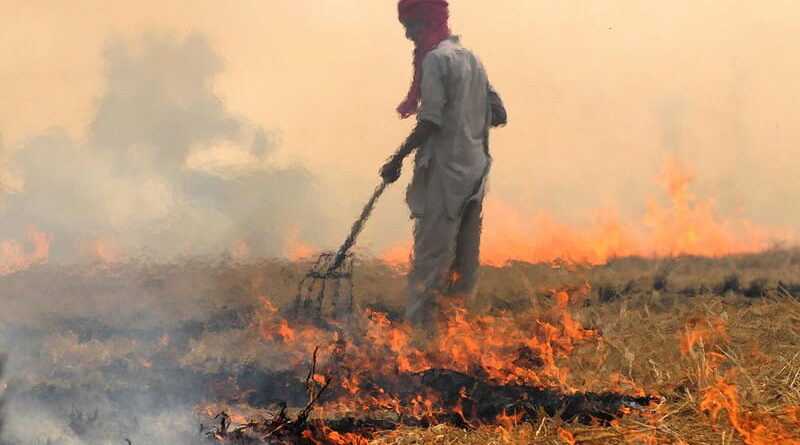Gradual decline in stubble burning cases across Haryana
21 October 2020, Chandigarh, IN: Consistent steps taken by Haryana Chief Minister, Mr. Manohar Lal to manage crop residue and stubble in the last six years have resulted in gradual decline in cases of stubble burning across the State of Haryana. This year about 1.75 lakh tonne of paddy stubble has been purchased by the Bio-Mass plants while it has been proposed to purchase 8.58 lakh tonne of the stubble during the entire season.
Also Read: 69 thousand farmers in Punjab to get relief worth 61 crore
This information was shared here today during a review meeting, chaired by Chief Principal Secretary to Chief Minister, Mr. D.S. Dhesi.
Thus, barely any stubble burning incident is likely to be reported this year in the state as the State Government has already made provision to allocate an amount of Rs 152 crore to provide machinery for stubble management at subsidized rates of up to 80 per cent through the Custom Hiring Centres. Besides this, 50 per cent subsidy for such machines will also be provided to every individual farmer. For the same, a provision of Rs 216.21 crore has been made this year.
In the meeting, it was informed that 24,705 stubble management machines including Straw balers, Hay-Racks, Super Cutters, Cutter Binders were made available last year whereas the bills of about 13 thousand machines have been uploaded this year. In addition to this, the number of Custom Hiring Centres will increase from 1,031 to 3,831 after the opening of new Custom Hiring Centres.
It was also informed in the meeting that a new portal has been launched by the Department on which the information of contractors and industries that will purchase the paddy stubble will be made available. The farmers who want to sell their stubble can directly contact them. The compensation of about Rs 1,000 per acre for stubble management is already being provided to the farmers. Apart from this, it is proposed to set up 25 Biomass Power Plants of 111.51 MW capacity, in which about 1.80 lakh tonne of paddy stubble will be used through HAREDA to use the starch for biomass energy.
MoU with Indian Oil Corporation
In addition, a Memorandum of Understanding has been signed with the Indian Oil Corporation, Panipat to set up an ethanol gas plant. Along with this, 66 MoUs have been issued so far to other oil companies for compressed biogas plants, which will generate a total gas capacity of 353.56 tonne gas per day. A plant with a capacity of 6 tonne per day is being set up in Kalanaur, Rohtak by M/s Spectrum Renewable Energy Private Limited which will use 15 per cent of the paddy straw and consume 4,320 ton of straw per year.
Also Read: Stock limit on the onions imposed to curb price rise
Similarly, a plant of 12.5 tonne per day capacity is being set up by Ajay Bio-Energy Private Limited at Bastara in Karnal, with 6,000 tonne stubble per annum capacity. The first phase of construction work has also been started by M/s Jagalan Contractor & Security Private Limited, with a capacity of 2.4 tonne per day in Daata, Hisar.
It was informed that Sainsons Paper Udyog Private Limited, Pehowa with a capacity of 2.4 tonne per day and Hindustan Petroleum Corporation have also set up a plant after signing a Memorandum of Understanding (MoU) and the plant has so far procured 43,000 tonnes of paddy stubble. Besides, stubble is being procured by the Naraingarh Sugar Mill and Shahabad Cooperative Sugar Mill in the private sector for generating biomass energy. Moreover, there are about 24 more industries which have agreed to use stubble for their energy consumption. Moreover, contractors and other farmer groups are being provided space to use the land of the Gram Panchayat to collect paddy stubble.
Four companies producing energy from paddy stubble in Kurukshetra, Kaithal, Jind and Fatehabad districts have agreed to set up their plants and they will use 5.7 lakh tonnes of paddy stubble every year as fuel.
It was also informed in the meeting that photos related to stubble burning are taken from Haryana Space Applications Centre (HARSEK) twice a day. Central Pollution Control Board had released the Air Quality Index (AQI) of 112 cities of the country in which Delhi’s AQI was 223, Noida, Faridabad and Gaziabad’s AQI was between 200 and 250, while Gurugram’s AQI was recorded below 200. Ambala, Hisar, Fatehabad and Karnal districts are being monitored specially.
Photo credit: CIAT International Center for Tropical Agriculture on Visual hunt / CC BY-SA















